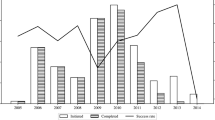Abstract
Conflict of interest between shareholders (principal) and managers (agent) is a potential weakness of the modern corporate form. Various monitoring mechanisms—pay for performance compensation schemes, mix of cash compensation and long term compensation, the independence of the board of directors, the market for takeovers, and capital structure—have been developed to discipline management and motivate them to maximize shareholder wealth. We test the hypothesis that dividend payout levels reflect the quality of and motivation for managerial decision making and are a function of performance and monitoring effectiveness. Consistent with this hypothesis, our analyses indicate that dividend payout, and dividend yield are functions of corporate performance, board structure, CEO tenure, and CEO ownership of company shares.
Similar content being viewed by others
References
Agarwal A, Knoeber CR (1996) Firm performance and mechanisms to control agency problems between managers and shareholders. J Financ and Quant Anal 31(3):377–397
Byrd J, Hickman K (1992) Do outside directors monitor managers? Evidence from tender offer bids. J Financ Econ 32:195–221
Campbell R, Ghosh C, Sirmans CF (2001) The information content of method of payment in mergers: evidence from real estate investment trusts (REITs). Real Estate Econ 29:360–387
Cho M-H (1998) Ownership structure, investment, and the corporate value: an empirical analysis. J Financ Econ 47:103–121
Chopin MC, Dickens RN, Shellor RM (1995) An empirical examination of compensation of REIT managers. J Real Estate Res 10(3):263–277
Crystal G (1991) In search of excess: the overcompensation of American executives. New York: W. W. Norton & Co
Davis BJ, Shellor RM (1995) Executive compensation and financial performance in the real estate industry. J Real Estate Res 10(2):141–151
EasterBrook F (1984) Two agency—cost explanations of dividends. Am Econ Rev 74:650–659
Farinha J (2003) Dividend policy, corporate governance, and the managerial entrenchment hypothesis: an empirical analysis. J Bus Finance and Account 30(9 and 10):1173–1200
Feng Z, Ghosh C, Sirmans CF (2005) How important is the board of directors to REIT performance? Forthcoming, J Real Estate Portf Manag 11(3):281-294 (Sep -Dec)
Fluck Z (1999) The dynamics of management—shareholder conflict. Rev of Financ Stud 12:379–404
Ghosh C, Sirmans CF (2003) Board independence, ownership structure and performance in real estate investment trusts. J Real Estate Finance and Econ 26(2–3):287–318
Ghosh C, and CF Sirmans (2005) On REIT CEO compensation: does board structure matter? J Real Estate Finance Econ 30(4):397–428
Holder ME, Langrehr FW, Hexter JL (1998) Dividend policy determinants: an investigation of the influences of stakeholder theory. Financ Manage 27(3):73–82
Hu A, Kumar P (2004) Managerial entrenchment and payout policy. Forthcoming, J Financ and Quant Anal 39(4), Dec 2004
Holthausen R, Larcker D (1996) The financial performance of reverse leveraged buyouts. J Financ Econ 42:293–332
Jensen MC (1986) Agency cost of free cash flow, corporate finance, and takeovers. Am Econ Rev 76:323–329
Lambert R, Larcker D, Weigelt K (1993) The structure of organizational incentives. Adm Sci Q 38:438– 461
Loderer C, Martin K (1997) Executive stock ownership and performance: tracking faint traces. J Financ Econ 45(2):223–255
Mishra CS, Nielsen JF (2000) Board independence and compensation policies in large bank holding companies. Financ Manage (Autumn), pp 51–70
Morck R, Shleifer A, Vishny RW (1988) Management ownership and market valuation: an empirical analysis. J Finan Econ 20:293–315
Pennathur AK, Shellor R (2002) The determinants of REIT CEO compensation. J Real Estate Finance and Econ 25(1):99–113
Rosenstein S, Wyatt JG (1990) Outside directors, board independence, and shareholder wealth. J Financ Econ 26:175–191
Rozeff M (1982) Growth, beta and agency costs as determinants of dividend payout ratios. J Financ Res 5:249–259
Schooley DK, Barney LD (1994) Using dividend policy and managerial ownership to reduce Agency costs. J Financ Res Vol XVII(3):363–373.
Shivdasani A (1993) Board composition, ownership structure, and hostile takeovers. J Account Econ 16:167–198
Subrahmanyam V, Rangan N, Rosenstein S (1997) The role of outside directors in bank acquisitions. Financ Manage 20(1–2):461–492
White HL (1980) A heteroskedasticity—consistent covariance matrix estimator and a direct test for heteroskedasticity. Econometrica 48:817–838
Yermack D (1996) Higher market valuation for firms with a small board of directors. J Financ Econ 40:185–211
Author information
Authors and Affiliations
Corresponding author
Rights and permissions
About this article
Cite this article
Ghosh, C., Sirmans, C.F. Do Managerial Motives Impact Dividend Decisions in REITs?. J Real Estate Finan Econ 32, 327–355 (2006). https://doi.org/10.1007/s11146-006-6805-8
Published:
Issue Date:
DOI: https://doi.org/10.1007/s11146-006-6805-8




